Strategic management in security sector institutions
Through its Strategic Management in Security Sector Programme, DCAF works to enhance the capacities of national governance bodies and security sector institutions for developing and implementing key strategic and policy documents, and to strengthen awareness, legal and institutional frameworks, and capacities of security sector agencies in strategic areas of institutional management and reform.
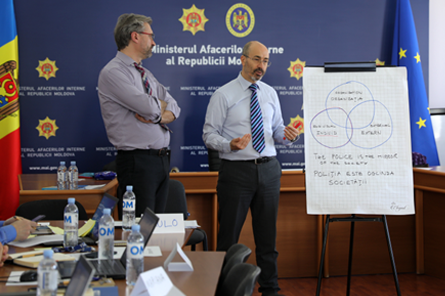
Workstreams/Projects
Learn more in the Project Factsheet
Read about the main achievements of the project in the bi-annual newsletter published by DCAF.
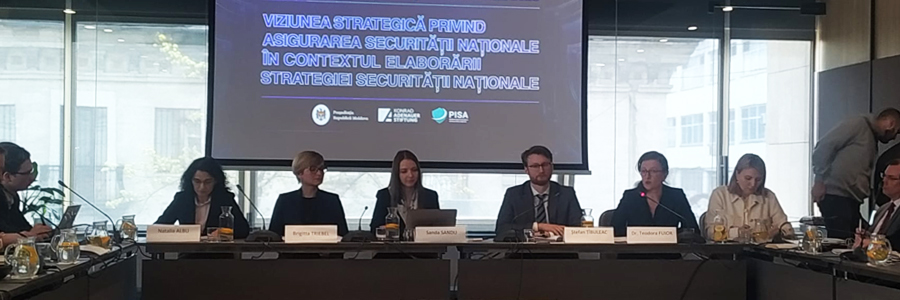
DCAF provides support to the Parliament and the Secretariat of the Supreme Security Council, to enhance national security governance.
This includes efforts to increase the executive and legislative capacities of those institutions, to contribute to the development of security sector strategies and policies, to advance the legislative and regulatory development of the security sector in a responsive manner, and to engage in meaningful coordination and oversight of security sector agencies. The project provides expert support in ongoing legislative processes, and offers opportunities for the members of parliament and staff from national governance bodies to attend trainings, workshops, or conferences on topics of relevance for security sector governance and reform, to enhance their expertise and knowledge.
Examples of recent activities/processes:
- Expert opinion on the draft Laws on the Security and Intelligence Service of the Republic of Moldova (SIS law) and the counterintelligence and external intelligence activity (CI law)
February-July 2023, Chisinau, Moldova. - Participation of the People’s Advocate (Ombudsman) of Moldova in the 15th International Conference of Ombuds Institutions for the Armed Forces (15ICOAF)
June 2023, Vienna, Austria.
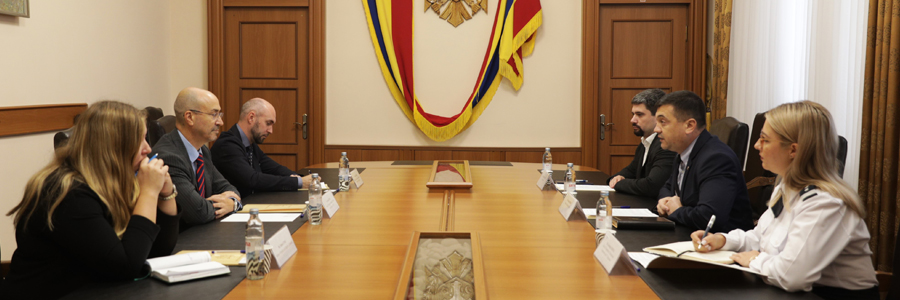
The project works on building and strengthening the strategic and operational management capacities of the Ministry of Internal Affairs (MIA) and the General Police Inspectorate (GPI).
DCAF helps the MIA and the GPI in strengthening their internal communications, in enhancing their capacities for integrity planning and for the prevention and reduction of corruption or other integrity violations, in developing legislative proposals and internal regulations, and in mainstreaming gender sensitivity within their policies, action plans, and curricula. The project offers training opportunities to MIA and GPI staff to increase their skills and knowledge, and offers a platform for exchange and learning from international good practices.
Examples of recent activities/processes:
- Workshop on strategic planning and training design for the MIA
March 2023, Chisinau, Moldova. - Workshop on integrity planning within the MIA and its subordinated institutions
April 2023, Chisinau, Moldova. - Regional conference on standard operating procedures for the use of body-worn cameras in law enforcement agencies
June 2023, Chisinau, Moldova. - Hybrid conference on strategic planning and management linked to the EU accession process
June 2023, Chisinau, Moldova. - Functional analysis of strategic planning within the MIA and its subordinated institutions
June 2023, Chisinau, Moldova. - Support to the MIA on developing indicators for measuring gender equality in Moldova security and defense institutions
August 2023-January 2024, Chisinau, Moldova.

DCAF aims to enhance public trust and awareness of security sector reforms through engagement with state security sector institutions, civil society organisations, and media.
On one side, the project supports state institutions in their external communication about reform processes. This is achieved through support to the institutions in their outreach activities and their efforts in establishing strategic communication plans. On the other side, the project aims to enhance civil society’s ability to contribute to an informed debate on security and rule of law topics. This is done through the steering of learning and knowledge production processes involving local civil society organisations and participants with non-governmental backgrounds, on topics of relevance for democratic governance of the security sector.
Examples of recent activities/processes:
- Development of a Cartography on International Assistance in Moldova
June-October 2023, Chisinau, Moldova. - Development of a Report on Security Sector Governance in Moldova
June-December 2023, Chisinau, Moldova. - Roundtable on Security Sector Governance in Moldova
June 2023, Chisinau, Moldova. - Women for Security Day
June 2023, Chisinau, Moldova.
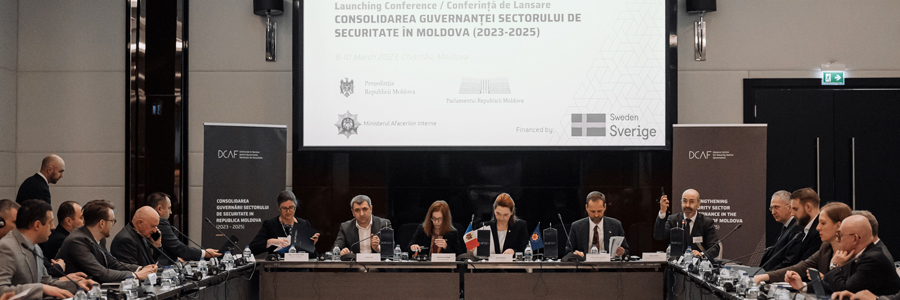 DCAF facilitates multi-stakeholder dialogue and promotes multi-stakeholder engagement between state and non-state actors, to enhance trust and develop models of cooperation, while discussing current trends and challenges of security sector reform in the country.
DCAF facilitates multi-stakeholder dialogue and promotes multi-stakeholder engagement between state and non-state actors, to enhance trust and develop models of cooperation, while discussing current trends and challenges of security sector reform in the country.
The multi-stakeholder roundtables are organised once or twice a year.
Read about our SSGM launching conference on the 9-10 March 2023 in Chisinau, Moldova
Upcoming multi-stakeholder roundtable:
- Building Resilience in Moldova, 10-11 October 2023 in Chisinau, Moldova
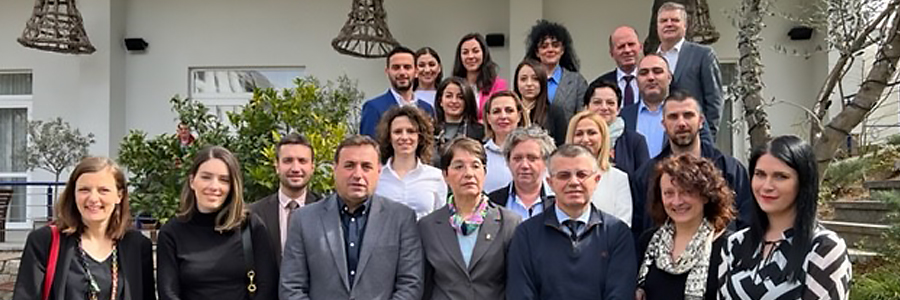 The project contributes to more informed cybersecurity policy discussions, both at the regional and national levels, by encouraging parliamentary staff and civil society organisations to play a more effective role in cybersecurity sector oversight and research.
The project contributes to more informed cybersecurity policy discussions, both at the regional and national levels, by encouraging parliamentary staff and civil society organisations to play a more effective role in cybersecurity sector oversight and research.
Examples of recent activities
- Seminar on Cybersecurity Good Governance for Parliamentary Staffers from the Western Balkans. Tirana, Albania, March 2022.
Knowledge Products
- Introduction to Cybersecurity Governance – A Tool for Members of Parliament
- Guide to Good Governance in Cybersecurity
- Democratic Governance Challenges of Cybersecurity
- Backgrounder on Cybersecurity Governance (upcoming publication)
- Book on Cybersecurity Oversight (upcoming publication)
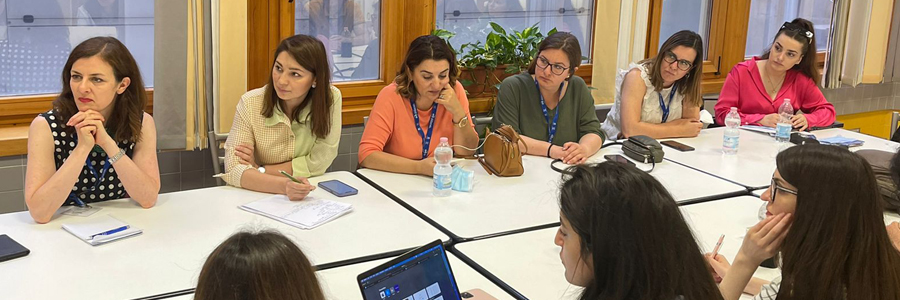 DCAF supports civil society and young leaders in their efforts to play a more active role in cybersecurity.
DCAF supports civil society and young leaders in their efforts to play a more active role in cybersecurity.
To contribute to informed regional cybersecurity policy discussions, the project has supported the establishment of a Western Balkans Cybersecurity Research Network, composed of civil society researchers from the region. The network research aspects covering cybersecurity and human rights, cybersecurity needs of vulnerable groups, gender, and cybersecurity, in their respective national contexts.
This effort produces more comparative research and information on the progress in cybersecurity governance in the region and supports Western Balkans civil society to engage more in cybersecurity issues and to develop, research, and draft recommendations that promote an approach to cybersecurity taking into account the security needs of all, for governments to integrate a more human-centric approach in their legal and policy frameworks.
Following the 2022 six-chapter book on Human Rights and Cybersecurity in the Western Balkans, the research network has prepared a publication on gender and cybersecurity, ready to be published in late October 2023.
Through our ‘Young Faces’ programme, we work on promoting cybersecurity policy research and knowledge sharing among young professionals across the Central and Eastern Europe region, aiming to involve young leaders to explore and engage in cybersecurity network and expertise. The programme champions the development of young professionals from the region, from the public and private sector, at the start of their careers to raise their awareness on important cybersecurity governance challenges. Over the course of six months and through a winter and summer schools, the participants can familiarise themselves with the topics, learn from international experts, share experiences with their peers, and play an active role in research of cybersecurity by producing policy papers under the mentorship of experts.
Spotlight: papers from DCAF’s Young Faces 2023
Promising cybersecurity ideas from emerging Western Balkans civil society leaders
DCAF’s Young Faces 2023 brought together over 30 young scholars and leaders for enriching seminars on cybersecurity, in the context of the UK Foreign, Commonwealth and Development Office (FCDO) supported-project, ‘Good Governance in Cybersecurity in the Western Balkans’. 17 out of this group wrote policy papers. These covered a range of issues of increasing importance in the six Western Balkans economies of the project: Albania, Bosnia and Herzegovina, Kosovo*, Montenegro, North Macedonia and Serbia.
* This designation is without prejudice to positions on status, and is in line with UNSC 1244 and the ICJ Opinion on the Kosovo declaration of independence.
DCAF spotlights three among all of the thoughtfully written papers:
Disclaimer: The views expressed are those of the authors alone and do not necessarily reflect DCAF positions.
- Ilvana Dedja's “Uncovering darkness: Child sexual abuse material online in Albania”;
- Amila Planinčić's “Importance of Introducing Cyber Security Policy Regulations and Practices into Education Systems in Bosnia and Herzegovina”, and
- Ornela Sollaku's “AI for Good Governance and Cybersecurity in the Western Balkans: Opportunities and Challenges”.
Papers from DCAF’s Young Faces 2022
- Doris Pasha’s ‘E-Governance and the Importance of Personal Data Protection in Albania’;
- Mejreme Asllani’s ‘Cyber Attacks and Critical Infrastructure in Kosovo’; and
- Oliver Risteski’s ‘Intrusions of State Digital Infrastructure in Macedonia: Digital Human Rights Impact Analysis’
Examples of recent activities
- Young Faces Winter School Webinars. Online, January 2022.
- Young Faces Summer School and participation in the European Dialogue on Internet Governance (EuroDIG). Trieste, Italy, June 2022.
- Workshop on Gender and Cybersecurity for the Western Balkans Cybersecurity Research Network. Durrës, Albania, July 2022.
- Advocacy campaign by the Western Balkans Cybersecurity Research Network. Western Balkans, Summer 2022.
Knowledge Products
- Cyber Violence Against Women and Girls in the Western Balkans: Selected Case Studies and a Cybersecurity Governance Approach
- Thematic Paper on Gender and Cybersecurity
- Western Balkans Cybersecurity Research Network: a six-chapter publication on Human Rights and Cybersecurity
- Western Balkans Cybersecurity Research Network: a six-chapter publication on Gender and Cybersecurity (upcoming publication)
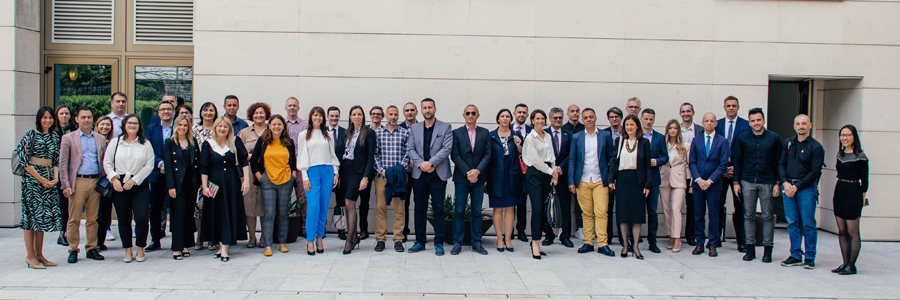 DCAF promotes cybersecurity capacity building in the Western Balkans to improve cyber-readiness of the societies through the strategic training of cybersecurity experts and the development of educational program in cybersecurity. The programme supports the inclusion of cybersecurity capacity building in national cybersecurity strategies, and the further development of cybersecurity education at all levels.
DCAF promotes cybersecurity capacity building in the Western Balkans to improve cyber-readiness of the societies through the strategic training of cybersecurity experts and the development of educational program in cybersecurity. The programme supports the inclusion of cybersecurity capacity building in national cybersecurity strategies, and the further development of cybersecurity education at all levels.
Contacts
Paulo Costa, Principal Programme Manager, (p.costa@dcaf.ch)
Teodora Fuior, Principal Programme Manager, (t.fuior@dcaf.ch)